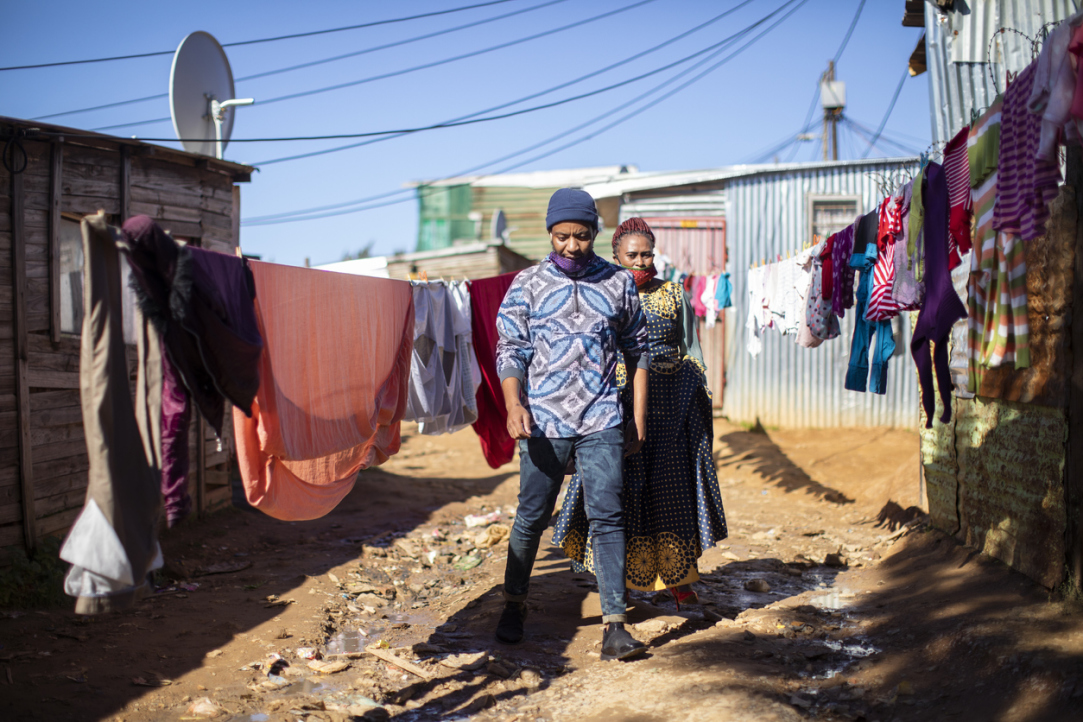The Dignity Factor: What Social Policy Should Look Like in the New Era

Abhijit Banerjee, one of the 2019 Nobel Prize winners in economics, spoke at a seminar at HSE University and explained why people trust economic forecasts less than a weather forecast and what can be done to bring this trust back.
A seminar in the Economics and Culture series, dedicated to the newly published Russian translation of the book Good Economics for Hard Times by Nobel laureates in economics, Abhijit Banerjee and Esther Duflo, was recently held by the HSE Centre for the History and Methodology of Economic Science in partnership with Leontiev Centre and with the support from RNG Joint Stock Company.

Abhijit Banerjee
Along with American economist Michael Robert Kremer, the book’s authors won the Nobel Prize in economics in 2019 for their study of the microeconomics of poverty-fighting programmes in different countries.
Abhijit Banerjee, who presented the book, spoke about the low level of public trust in economists and their forecasts.
Surveys have shown that Americans view economists’ competency much lower than the that of doctors, teachers and even weather forecasters
‘They don’t trust us because they think we’re wrong. People see us as unreliable experts,’ said Abhijit Banerjee.
Due to incorrect forecasts, governments and companies take wrong steps in areas that are sensitive for millions of people. Economists conduct high-quality theoretical studies, but they are missing communication, which should bring their work closer to real life, and make it clear and useful.
The world is an even bigger mess today than it was in 2018 when the book was written, he says. However, its key points still hold. According to Banerjee, the pandemic underscored the fact that governments continue to play a key role in resolving severe crises.
It is important to understand the impact of economic incentives. In particular, many people had been concerned that helicopter money in the USA would make people lazy. But research has shown that those who do not approve of such economic measures continue working despite the free money they get.
Economists also rely very much on mobility across professions, locations and jobs as a way to equilibrate the economy. But today, the mobility is declining significantly, and the popular stereotype about the high mobility of Americans doesn’t seem to be true anymore.
In other countries, mobility is causing major problems. In particular, in India, the lockdown had disastrous consequences: many workers who had come from other regions had to walk back to their villages.
It is also important to understand how racially and ethnically divided the reaction to the same economic and social challenges is. Economists are only now beginning to work constructively with racial and ethnic issues in the USA.
One of the areas where economics has systematically failed is the emphasis of dignity. People work not just for money, but for dignity, for what they see as their place in society and in their community
In terms of dignity, there are many places where there are no longer any good jobs but where people can preserve their dignity, Abhijit Banerjee believes. We should consider the factor of dignity, or we will be making mistakes. ‘We should understand people’s motivation, and if we don’t understand it, our calculations and conclusions would be wrong,’ he believes. ‘The state should put dignity back in the centre of social protection; this must be a key issue of social policy,’ the Nobel laureate believes.
When people develop measures to prevent climate change, it is important that they create more opportunities for the poorest part of the planet’s population, he said. Correct theoretical constructions are not always implemented in practice, which causes millions of people to be dissatisfied due to the negative impact on their everyday lives. If people lose their source of income due to economic change, governments must think how to compensate for their losses and only after that should they try to persuade them that a global world and global trade are good things. ‘Economics is not a funny thing in general, and we are living in sad Dickensian times,’ Banerjee concluded.

At the same time, he believes that in today’s circumstances, introducing a universal basic income would not be a reasonable measure.
The pandemic impacted the socio-economic priorities of many countries and supernational institutions. In particular, today’s American administration is acting more profoundly in social and monetary policies. The ECB has also opened its reserves for the first time, and this institution has been very reluctant to give away money. A big shift happened in the West: rich countries have been spending up to 20% GDP to help the public. In developing countries, however, this share is only 2%, with their citizens being much poorer. ‘I’m not blaming the poor countries, but the rest of the world, which didn’t help them much.’
Vsevolod Ostapenko, Visiting Lecturer at the HSE St. Petersburg School of Economics and Management Department of Economics asked the speaker about the key sources of bad economics – wrong methods, ideological bias, or wrong data – and whether it is acceptable to believe that the thesis on the usefulness of free trade is wrong.
Abhijit Banerjee argues that the most important issues in contemporary economics are not limited to speculation on free trade or macroeconomic stability. It is important to combine precise data with high-quality theories for their calculation and generalization.
Economics fails on a very basic level when experts fail to implement its principles in practice as they choose the wrong points of application
It is important to forecast who might lose from free trade, what the losses will be in specific areas of the economy and regions, and to elaborate the mechanisms that alleviate these losses, and the reaction of the losers. ‘We should not revisit economic theory, but we should recalibrate it,’ he believes.
Macroeconomic forecasts remain an important part of economists’ work, but at the same time, they should help governments detect specific problems. During the pandemic, many countries were willing to reform the social aid system, for example by developing a support infrastructure. ‘If we focus on the problems that worry people today, we could have helped, which would reinforce people’s trust in economists and economics,’ Banerjee said.
The Nobel Prize winner believes that in the future, a growth based on environmentally friendly economics is possible. He gave the example of the steady decrease in prices of solar panels over the last decade. Meanwhile, this growth should be profitable not only for developed, but for developing countries. We need to persuade the rich countries’ elites to help the poor ones.
Vsevolod Ostapenko
See also:
‘Teaching Is a Learning Experience for Me—Every Question Is an Opportunity to Update My Lecture Material’
Kemal Kivanc Akoz is an Assistant Professor of the Department of Theoretical Economics at the Faculty of Economic Sciences. He has been at HSE University for six years and his current activities include research into marriage market dynamics and information agreements among groups of agents. In this interview with the HSE News Service, Kemal talks about the subjects of his research, the teaching approach that led to him being named one of the university’s Best Teachers, his favourite places to get a coffee in Moscow, and more.
‘I Hope You Have Entered the Economic Profession Consciously’
On November 11, 2024, the HSE Faculty of Economic Sciences hosted a celebration for Economist Day. Many of the university's partners came to congratulate HSE on the occasion. The atrium on Pokrovsky Bulvar hosted booths from VkusVill, Ozon, HeadHunter, Wildberries, and other leading companies. Students and professors participated in quizzes, spun the wheel of fortune, painted, and crafted.
Maxim Reshetnikov: ‘An Effective Open Market Economy Has Been Built in Russia’
On November 11, 2024, during Economist Day in Russia, Maxim Reshetnikov, Russian Minister of Economic Development, spoke to students of the HSE Faculty of World Economy and International Affairs about Russia’s foreign economic activities, how the country managed to withstand unprecedented sanctions pressure, and the current state of its development.
FES Announces the Winner of the Nobel Prize in Economics 2024 Prediction Contest
The HSE Faculty of Economic Sciences summarised the results of its traditional prediction contest. FES holds this contest annually on the eve of Nobel Week. This year, the contest once again attracted participants from different regions of Russia and countries around the world. Remarkably, one participant managed to predict all three laureates of the 2024 Economics Prize.
Try Your Hand at Predicting the 2024 Nobel Prize Winner in Economics
The Faculty of Economic Sciences is launching its annual prediction contest. On October 14, the Nobel Committee will announce the winners of the Sveriges Riksbank Alfred Nobel Prize in Economic Sciences live on air. You have time to prepare and explore the landscape of contemporary economic thought. What topics and areas are considered particularly important and promising at the moment? Anyone can win.
Choosing the Right Server Results in Better Outcomes in Doubles Tennis
The Roland Garros tennis tournament, one of the most prestigious in the world, began on May 26. The prize money for this year's French Open totals nearly 54 million euros, with athletes competing in both singles and doubles events. In doubles tennis, choosing the right strategy for a match is crucial. Athletes' ability to adapt to the dynamics of the match and strategically choose the server can earn the pair up to 5% more points, according to Nikolai Avkhimovich, doctoral student and research fellow at the Laboratory of Sports Studies of the HSE Faculty of Economic Sciences. A paper with the study findings has been published in Applied Economics.
Consumer Prices Decrease in Densely Populated Areas
HSE University economists have proposed a novel approach to modelling monopolistic competition with heterogeneous firms and consumers. The results of collaborative research carried out by Alexander Tarasov from Moscow, his co-authors from HSE University–St Petersburg, together with the Norwegian School of Economics, the University of Pennsylvania, and the Free University of Brussels, have been published in American Economic Journal: Microeconomics.
Football Players Cover Greater Distances During Critical Derby Matches at Home Arena
Researchers at the HSE Faculty of Economic Sciences examined the level of effort that professional football players are willing to exert during a match in absence of financial incentives. It appears that the primary factors driving players to strive harder for victory are the strength of the opponent and the significance of the match for the club. This is particularly noticeable in derby matches between teams from the same city, such as the Moscow derby between CSKA and Spartak on April 25, 2024. The study has been published in the Journal of the New Economic Association.
Participation in Crowdfunding Can Generate up to 73% in Returns Annually
Backers of projects on crowdfunding platforms can expect rewards from their pledges. For example, funding someone's idea on Kickstarter can result in an average annual return of 11.5%, with design projects known to deliver returns as high as 70%. However, it is important to note that these returns do not come in the form of direct cash payments but rather as savings on the purchase of the product once it hits the market. This has been demonstrated in a study by researchers at the HSE Faculty of Economics published in Economic Analysis Letters.
Economists Suggest Using Media's Attention to Bitcoin to Predict its Returns
Researchers at the HSE Faculty of Economic Sciences have studied the relationship between the changes in the bitcoin prices and the media attention to this cryptocurrency. The researchers examined the mentions of bitcoin in the media between 2017 and 2021 and built a mathematical model that revealed the strong relationship between media attention and bitcoin prices. The study was published in the Applied Stochastic Models in Business and Industry journal.


